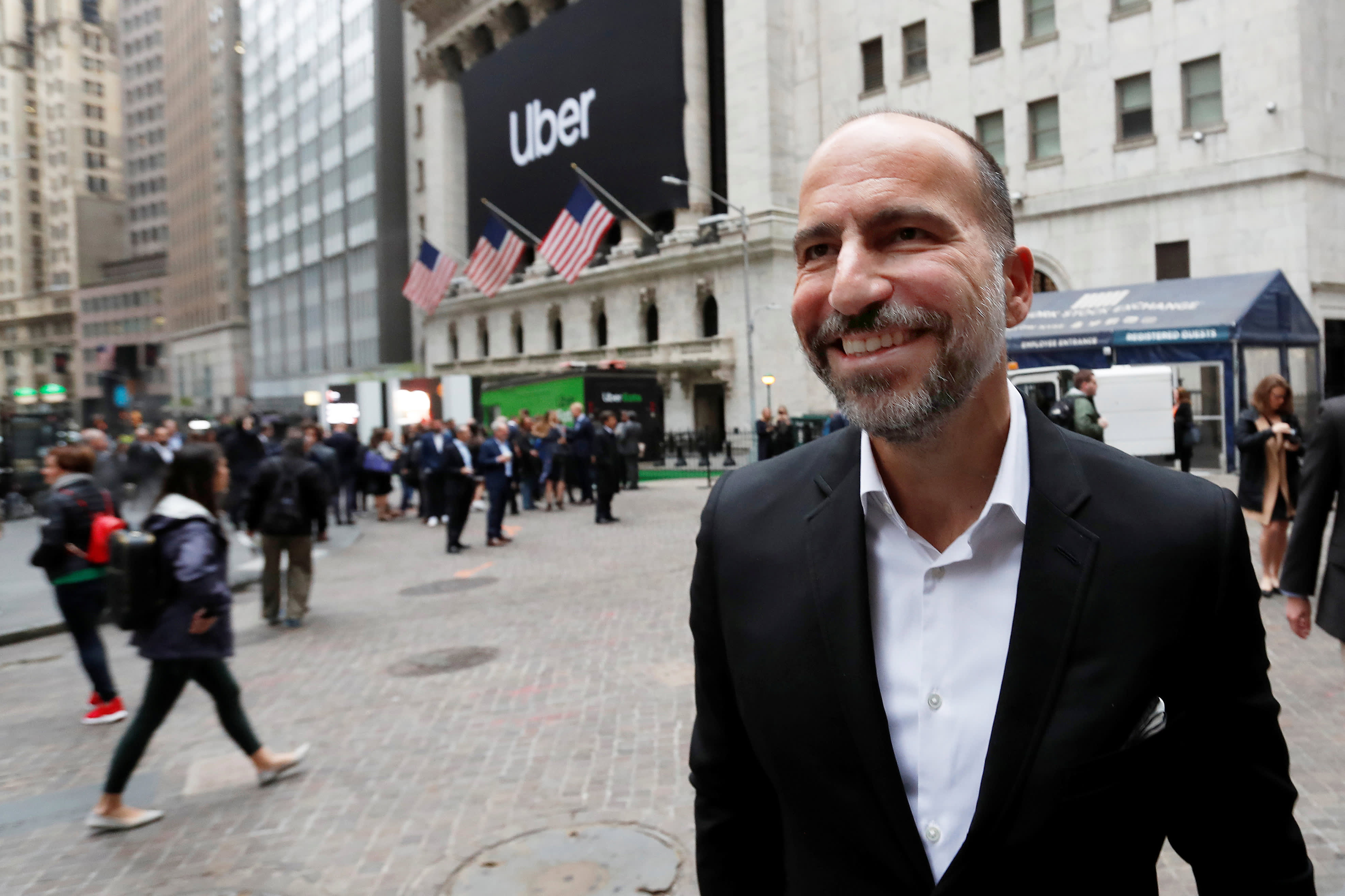
Uber Technologies CEO Dara Khosrowshahi stands outside the New York Stock Exchange ahead of the company's IPO May 10, 2019.
Andrew Kelly | Reuters
Uber will report earnings for its first time since its public market debut earlier this month.
Here are the numbers analysts are expecting for Uber's first quarter of 2019:
- Net loss: $1.01 billion estimated, according to Refinitv
- Revenue: $3.04 billion estimated, according to Refinitiv
Uber estimated Q1 2019 revenue would fall between $3.04 billion and $3.10 billion in a filing with the Securities and Exchange Commission ahead of its IPO. That compares with $2.58 billion in revenue the company reported for the first quarter of 2018. Uber said in the filing it expects a net loss between $1 billion and $1.11 billion for the quarter, compared to net income of $3.75 billion it reported for the same period last year.
Uber had a disappointing debut after being one of the most-hyped IPOs of the year. The company had been seeking a valuation as high as $120 billion in its IPO according to early reports, but the stock instead sunk 7.6% on its first day of trading to a market cap of $69.7 billion. The stock has continued to slide below its $45 IPO price, closing under $40 on Wednesday with a market cap of $67 billion.
Analysts have been skeptical about Uber's losses, especially given that its revenue growth has begun to decelerate in recent quarters, according to its IPO prospectus. Uber will likely need to show signs of continued growth in gross bookings and take rate to gain back confidence.
Uber reported gross ride-sharing bookings of $41.5 billion in 2018, compared to $31.4 billion in 2017. Gross bookings represents the full dollar value of an Uber ride, Uber Eats delivery or amount paid by shippers on Uber Freight. Gross booking for Uber Eats were $7.9 billion in 2018 compared to $3 billion in 2017, according to the company.
The company's take rate, which represents Uber's core platform adjusted net revenue as a percentage of core platform gross bookings, is also an important signal of the Uber's health. For ridesharing, Uber reported a 22% take rate in 2018 compared to 21% in 2017 due to increased booking fees in certain markets, according to the company. Its take rate for Uber Eats declined from 12% in 2017 to 10% in 2018 due to greater driver incentives, expansions to new areas and more restaurants with a lower average basket size.
"While investors have been expecting take rate compression as competition pushes irrationality and rider incentives in the near-term, we expect a focus on a path to improvement and accelerating revenue growth over the remainder of 2019 and into 2020, particularly as Lyft noted on its 1Q call that it believes the domestic rideshare market is becoming increasingly rational," Wedbush Securities analysts wrote in a note Tuesday.
In its first earnings report, Lyft President John Zimmer told analysts "this is the most rational the market has been," giving hope that ride hailing companies can begin to lower the incentives they offer to bring drivers to their platforms. The cost of paying and incentivizing drivers to join their platforms has weighed heavily on both Uber and Lyft's bottom lines, which is why both companies have been investing in autonomous vehicle options.
Uber has diversified its business in an effort to grow its reach and take an Amazon-like approach to transportation. Analysts will be looking for how Uber Eats performed in the quarter, a business that brought in nearly $1.5 billion in revenue for the company in 2018.
Wedbush analysts said that Uber Eats will face increased pressure in the short-term as competition strengthens in the market from firms like U.K.-based Deliveroo, which recently raised another $575 million in funding led by Amazon.
Watch: CNBC's full interview with Uber CEO Dara Khosrowshahi ahead of its IPO
No comments:
Post a Comment